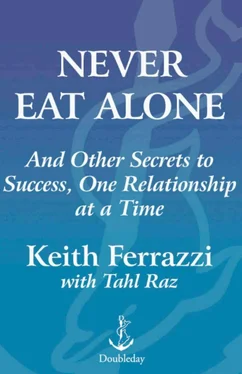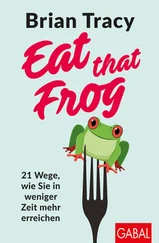Keith Ferrazzi - Never Eat Alone
Здесь есть возможность читать онлайн «Keith Ferrazzi - Never Eat Alone» весь текст электронной книги совершенно бесплатно (целиком полную версию без сокращений). В некоторых случаях можно слушать аудио, скачать через торрент в формате fb2 и присутствует краткое содержание. Год выпуска: 2005, ISBN: 2005, Издательство: C U R R E N C Y • D O U B L E D A Y, Жанр: marketing, на английском языке. Описание произведения, (предисловие) а так же отзывы посетителей доступны на портале библиотеки ЛибКат.
- Название:Never Eat Alone
- Автор:
- Издательство:C U R R E N C Y • D O U B L E D A Y
- Жанр:
- Год:2005
- ISBN:0-385-51529-4
- Рейтинг книги:4 / 5. Голосов: 1
-
Избранное:Добавить в избранное
- Отзывы:
-
Ваша оценка:
- 80
- 1
- 2
- 3
- 4
- 5
Never Eat Alone: краткое содержание, описание и аннотация
Предлагаем к чтению аннотацию, описание, краткое содержание или предисловие (зависит от того, что написал сам автор книги «Never Eat Alone»). Если вы не нашли необходимую информацию о книге — напишите в комментариях, мы постараемся отыскать её.
Never Eat Alone — читать онлайн бесплатно полную книгу (весь текст) целиком
Ниже представлен текст книги, разбитый по страницам. Система сохранения места последней прочитанной страницы, позволяет с удобством читать онлайн бесплатно книгу «Never Eat Alone», без необходимости каждый раз заново искать на чём Вы остановились. Поставьте закладку, и сможете в любой момент перейти на страницу, на которой закончили чтение.
Интервал:
Закладка:
When our lonely lives catch up with us, we turn to self-help literature for answers, but it isn't SELF-help we need, I'd argue, it's help from others. If you buy this, and I hope that you do, then what I teach in this book is the perfect antidote to all this talk of imbalance. Connecting is that rare thing that lets us have our cake and eat it, too. We end up serving the interests of both our work and our life, ourselves and others.
Oscar Wilde once suggested that if a person did what he or she loved, it would feel as if they never worked a day in their life. If your life is filled with people you care about and who care for you, why concern yourself with "balancing" anything at all?
31. Welcome to the Connected Age
We human beings are social beings. We come into the world as the result of others' actions. We survive here in dependence on others. Whether we like it or not, there is hardly a moment of our lives when we do not benefit from others' activities. For this reason, it is hardly surprising that most of our happiness arises in the context of our relationships with others.
— DALAI LAMAhere has never been a better time to reach out and connect than right now. The dynamic of our society, and particularly our economy, will increasingly be defined by interdependence and interconnectivity. In other words, the more everything becomes connected to everything and everyone else, the more we begin to depend on whom and what we're connected with.
Rugged individualism may have ruled for much of the nineteenth and twentieth century. But community and alliances will rule in the twenty-first century. In the digital era, when the Internet has broken down geographic boundaries and connected hundreds of millions of people and computers around the world, there's no reason to live and work in isolation. We've come to realize, again, that success is not contingent on cool technology or venture capital; it's dependent on whom you know and how you work with them. We've rediscovered that the real key to profit is working well with other people.
We've taken some lumps getting back to this fundamental truth. All the changes, all the fads, all the technologies of the last decade too often foundered on the human factor, leading the business world to treat people less as human beings than as just so many bits and bytes. We placed our faith in gadgets, processes, new organizational structures, stock market prices. When these things didn't deliver on their promise, we returned to us, you, and me.
Life is about work, work is about life, and both are about people. "The most exciting breakthrough of the twenty-first century will occur not because of technology, but because of an expanding concept of what it means to be human," said the futurist John Naisbitt. Technology has proved no substitute for personal relationships. To the contrary, it seems to be enhancing them. Look around you and you'll see this expanded view of what it means to be human, and how we interact with one another, in action. Here's just a small sampling:
• The hottest trend these days is found in social-networking software tools, and services like Spoke Software, Plaxo, and Linkedln. People are now finding new ways to use technology to connect people with bonds of trust and friendship. Some are calling it a social revolution.
• Blogs, part of the same phenomenon, are allowing passionate individuals with good content to reach literally millions of other people. These self-sustaining communities are flourishing. In the future, as personal branding continues to solidify itself as a mainstay in the economy, blogs will become as ubiquitous as resumes.
• Social scientists are making remarkable discoveries about the power of social networks. Recent research findings are proving that people who are more connected with other people live longer and are healthier. In communities where people are connected, the schools work better, the crime rate is lower, the economic growth rate is higher. Bringing people together by building personal relationships is becoming far more than a career strategy; it's increasingly regarded as one of the most effective ways to enhance America's civic and social health.
• Old-style labor unions and guilds are showing signs of revitalization. As the outsourcing of jobs outside the United States continues, and more and more of us become free agents, Americans are finding strength in membership to something larger than themselves. We're giving our loyalty and our trust not to companies but to our peers.
That's just a small taste of what's to come. We are in the formative stages of a new era of connectivity and community. You now have the skills and knowledge to thrive in this environment. But to what end? How will you thrive? What does it mean to live a truly connected life?
Certainly, some of us will tally success in terms of income and promotions. Others will cite their newfound celebrity or the exciting expertise that they've amassed. For others still, it will be the fabulous dinner parties they throw or the aspirational contacts they've befriended.
But will such success feel empty? Instead of being surrounded by a loving family and a trusted circle of friends, will you only have colleagues and clients?
Sooner or later, in one way or another, we all will ask ourselves these questions. Moreover, we'll look back on our life and wonder, What is my legacy? What have I done that is meaningful?
How many of you can recall the names of the last three CEOs of General Motors, IBM, or Wal-Mart? Are you struggling to come up with names? Now try and recall three important figures in the Civil Rights Movement. Ah, here people usually can name six or more.
Ultimately, making your mark as a connector means making a contribution—to your friends and family, to your company, to your community, and most important, to the world—by making the best use of your contacts and talents.
It's funny what events in life will make you question where you're headed and what you value most. I remember as a young man, for instance, dreaming of owning my own Brooks Brothers button-down shirt. All throughout my years growing up, I wore hand-me-downs from my mom's cleaning customers' kids or I'd find my clothes in secondhand thrift shops. I thought that when the day came that I could walk into a shop like Brooks Brothers and buy my own firsthand shirt (for retail!), well, that would be the day I arrived.
That day came. I was in my mid-twenties and I proudly bought the finest, most expensive button-down shirt Brooks Brothers sold. The next day I wore that shirt into work as if it were a rare, emerald-studded gown from the Victorian era. Then I washed it. I remember pulling my shirt from the washer and—gasp!—two buttons had fallen off. I kid you not. This, I asked myself, is what I've been waiting for all my life?
As noted author and speaker Rabbi Harold Kushner once wisely wrote, "Our souls are not hungry for fame, comfort, wealth, or power. Those rewards create almost as many problems as they solve. Our souls are hungry for meaning, for the sense that we have figured out how to live so that our lives matter so the world will at least be a little bit different for our having passed through it."
But it would take many more missing buttons before I truly started to ask myself what meaning, exactly, my soul was hungry for.
That time finally came with what I call my own personal minirevolution. Revolutions sometimes begin in the least likely of places with the least likely of heroes. Who could imagine that a small Indian man with a very strong accent could challenge what I wanted out of life and how I was going to attain it? Or that doing nothing and remaining silent for ten days, rather than trying to do everything all at once, could change the course of my life?
Читать дальшеИнтервал:
Закладка:
Похожие книги на «Never Eat Alone»
Представляем Вашему вниманию похожие книги на «Never Eat Alone» списком для выбора. Мы отобрали схожую по названию и смыслу литературу в надежде предоставить читателям больше вариантов отыскать новые, интересные, ещё непрочитанные произведения.
Обсуждение, отзывы о книге «Never Eat Alone» и просто собственные мнения читателей. Оставьте ваши комментарии, напишите, что Вы думаете о произведении, его смысле или главных героях. Укажите что конкретно понравилось, а что нет, и почему Вы так считаете.












